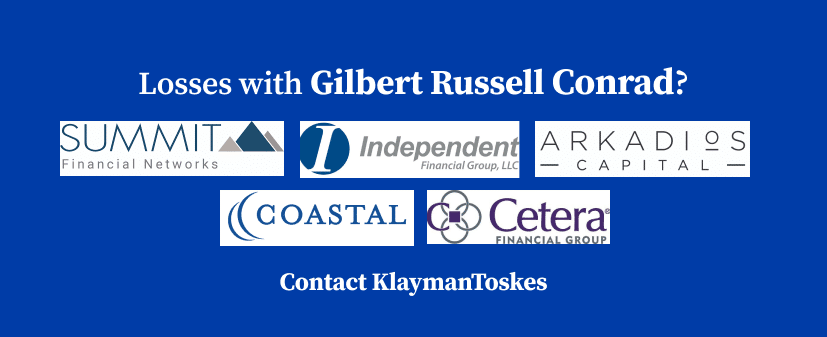
National investment loss lawyers KlaymanToskes continues investigating Gilbert Conrad (CRD# 2746778) following the firm’s filing of a customer complaint alleging $5,000,000 in investor damages against the Lewiston, New York-based broker in connection with the unsuitable sale of illiquid alternative investments, including the following:
Gilbert Conrad was previously licensed as a broker with Independent Financial Group and Arkadios Capital. He is currently registered as a broker with Coastal Equities, Inc. in Lewiston, NY.
Investors that suffered losses with Gilbert Russell Conrad are encouraged to contact attorney Lawrence L. Klayman, Esq. at (888) 997-9956 or lawrence@klaymantoskes.com to discuss recovery options. We do not collect attorney’s fees unless we are able to obtain a financial recovery for you.
KlaymanToskes previously reported that the firm filed a FINRA arbitration claim (no. 23-00927) seeking up to $5,000,000 in investment loss recovery against Gilbert Russell Conrad and Cetera Advisors, in connection with his recommendation of unsuitable, illiquid, and speculative Alternative Investments.
Gilbert Conrad allegedly misrepresented the risks associated with Alternative Investments and failed to disclose the investment characteristics to the customer. As unsophisticated investors, the 82-year-old customer and her late husband were unaware that the investments were illiquid and essentially locked-up until maturity.
According to public record, Conrad has two settled customer complaints for unsuitable investment recommendations in Alternative Investments, including one complaint that was settled in favor of the investor for $235,000.
Alternative investments include Non-traded REITs, Business Development Companies (BDCs), Private Placements, Direct Participation Partnerships (DPPs) & Limited Partnerships (LP Interests), 1031 Exchanges, Hedge Funds, and Oil & Gas investments.
These investments may be unsuitable for investors with a need for financial security and an ability to readily access funds when needed, such as elders and retirees, due to their illiquidity, high risk levels, lack of regulatory oversight, and complex nature.
In addition, alternative Investments may be misrepresented by brokers/advisors who fail to fully disclose the risks and liquidity problems involved to their customers, as these investments are often high-risk, have limited liquidity, and carry high expenses and fees.
Alternative Investments typically involve many risks for investors, including the following:
Illiquidity:
Regulatory Issues:
Complexity:
Your brokerage firm and advisor are obligated to recommend a suitable portfolio according to your net worth, age, risk tolerance, and other factors. If they do not, you may be entitled to a financial recovery.
If you suffered Alternative Investment losses due to your brokerage firm/financial advisor, contact attorney Lawrence L. Klayman, Esq. at (888) 997-9956 or lawrence@klaymantoskes.com for a free and confidential consultation.
FINRA (Financial Industry Regulatory Authority) is the self-regulatory organization responsible for registering and regulating every broker and brokerage firm engaging in business with retail customers. Under FINRA suitability requirements (FINRA Rule 2111) brokers/advisors and their firms have a duty to recommend suitable financial products and trading strategies based on their client’s financial interests and needs.
Facts about each investor, such as their financial situation/needs, age, employment status, tax status, investment objectives and experience, risk tolerance, and what other investments they may be holding must be taken into consideration by brokers/financial advisors in order to meet the “reasonable diligence” requirement of FINRA’s suitability rule. These factors help determine the suitability of a particular investment or investment strategy for a particular investor.
If your stockbroker or financial advisor recommended unsuitable alternative investments based on your investment profile or disregarded your risk-tolerance when making investment recommendations, you may be entitled to a financial recovery through FINRA arbitration.
Customers of Gilbert Russell Conrad and/or any other broker/investment advisor who suffered investment losses are encouraged to contact attorney Lawrence L. Klayman, Esq. at (888) 997-9956 or lawrence@klaymantoskes.com for a free and confidential consultation to discuss legal options. We do not collect attorney’s fees unless we are able to obtain a financial recovery for you.
KlaymanToskes is a leading national securities law firm which practices exclusively in the field of securities arbitration on behalf of retail and institutional investors throughout the world in large and complex securities matters. The firm has recovered over $250 million in FINRA arbitrations and over $350 million in other securities litigation matters. KlaymanToskes has office locations in California, Florida, New York, and Puerto Rico.
KlaymanToskes, P.A.
Lawrence L. Klayman, Esq.
888-997-9956
lawrence@klaymantoskes.com
www.klaymantoskes.com